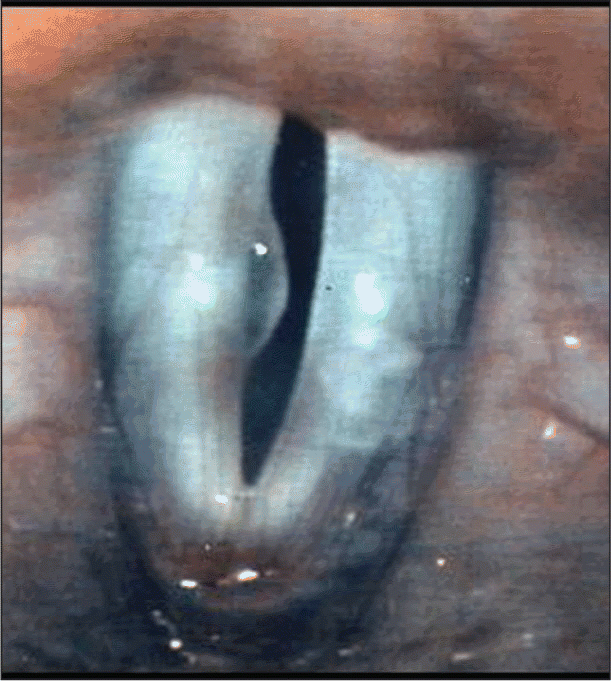Part 2 of 2 articles
Explore This Issue
October 2009Cysts on vocal folds can be complicated lesions to manage: Postsurgical healing can be difficult to forecast, and the effects on the voice can also be difficult to determine until after surgery. Even determining whether a lesion is a cyst, a polyp, or a pseudocyst is often problematic. Panelists at the 89th Annual Meeting of the American Broncho-Esophagological Association presented several cases to illustrate the difficulties inherent in treating vocal fold cysts.
Case 1: Severe Glottal Closure
The first case discussed by the panelists involved a 35-year-old elementary school teacher with severe glottal closure symptoms. At the end of the day she had worse vocal fatigue, and by Thursday and Friday afternoons, she had almost no voice. She did not drink or smoke. During an examination, a lesion was found on her right vocal fold (see Figure 1).
The first problem was determining what kind of lesion it was. Michael Pitman, MD, Director of the Voice and Swallowing Institute at the New York Eye and Ear Infirmary, considered it a polyp-almost like a watery, edematous polyp, and I treat them as such.
I think they do sometimes have a chance of going away, especially in someone with a history like this, he said. This person, I think, I would really be put through the wringer in terms of therapy and a voice saver to use at school, and all the other things you can do before having her make the decision about surgery.
I don’t know what I’d call it, said Robert H. Ossoff, DMD, MD, Executive Medical Director of the Vanderbilt Voice Center in Nashville. What’s in a name?
But he did say, I don’t expect the lesion to go away with voice therapy. On the other hand, voice therapy is very helpful with these patients, because it does help them to alleviate some of the cofactors in creating an environment of laryngeal hygiene.
He said he would try to keep the patient able to function on the job as long as possible. My goal is, if I can get them through the week and they have the weekend to rest and they do fine that way, I keep them out of the operating room, he said. Eventually-and it varies in terms of the length of time-all of a sudden they won’t be able to recover over the weekend and it’s going to take a vacation. And then it’s going to take the summer. And then they don’t recover…. I don’t expect that they’re going to go away but I do think we can delay the inevitable surgery for a while and give them a chance to work with a therapist.

Leave a Reply